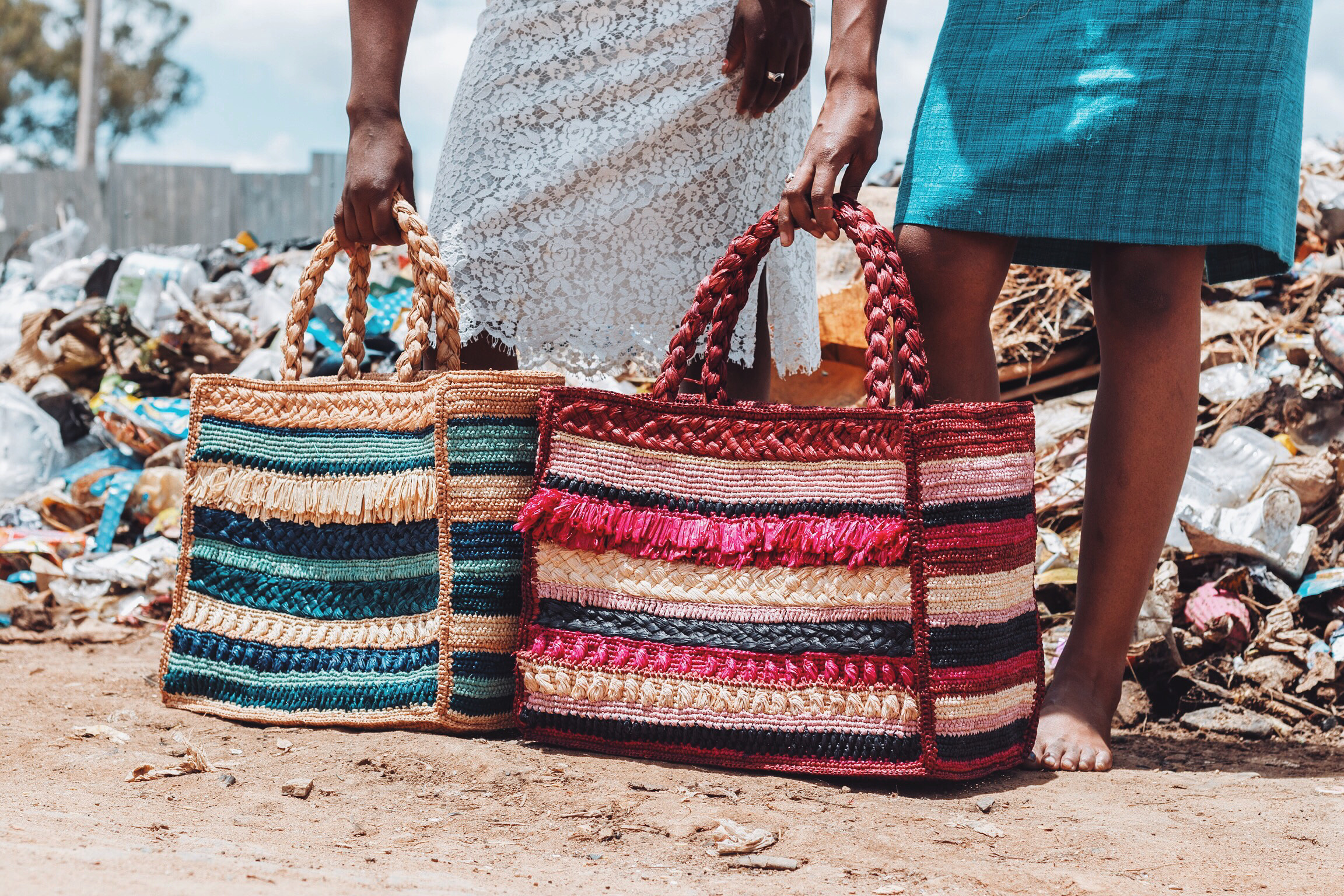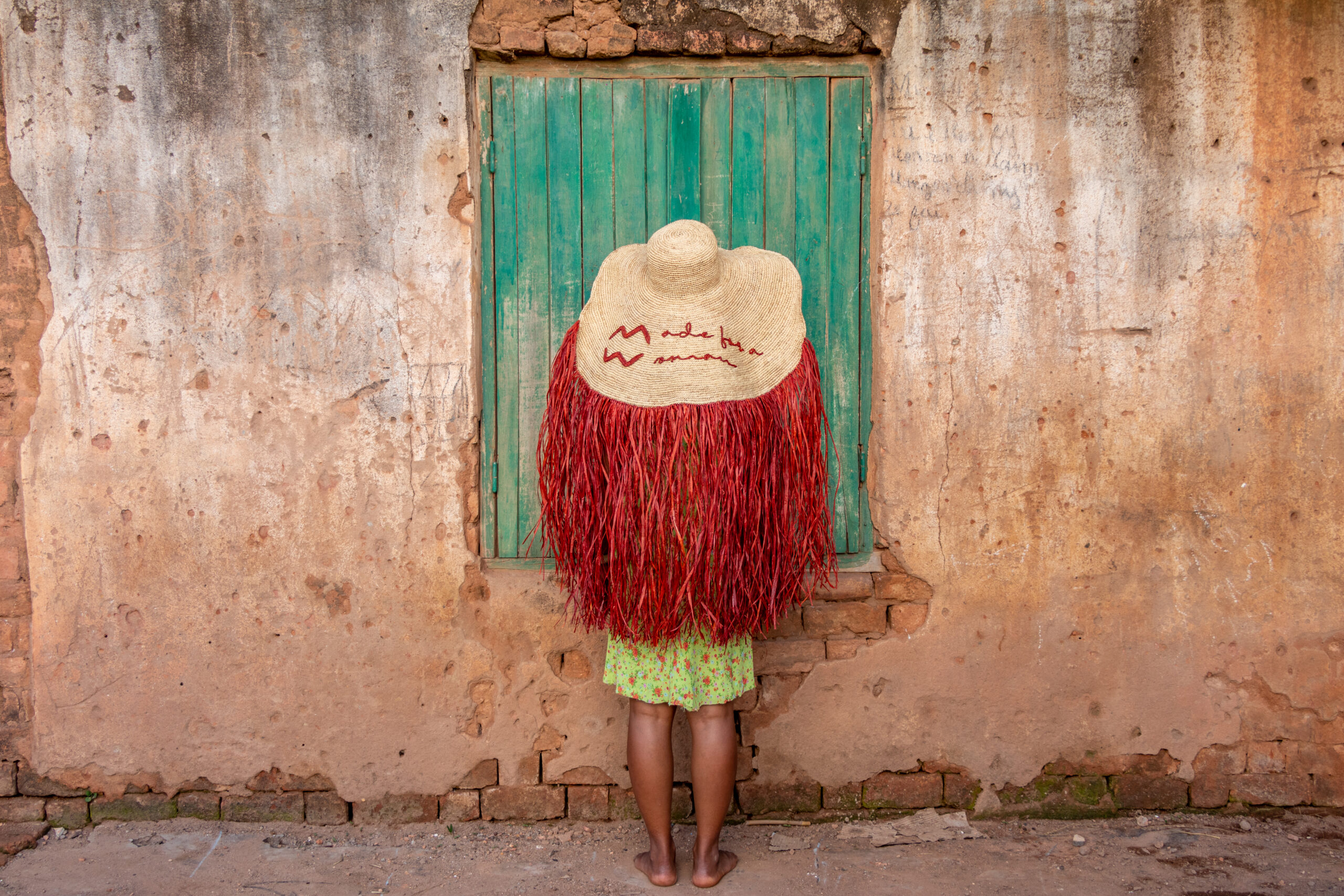Unforgettable atmospheres, paradisiacal beaches and unspoiled nature characterize Madagascar; towering skyscrapers, lights and a fascinating frenzy are the peculiarities of Milan: what do these two cities have in common?
Here at “The Green Side Of Pink” we found an innovative trait d’union between two apparently irreconcilable realities: its name is “Made for a Woman”, and it is a sustainable Italian-Malagasy brand.
The brand was founded in 2018 by Eileen Akbaraly, a young activist (she worked with various humanitarian associations, including “4aWoman Onlus” and “Fitiavana Association”), of Italian-Indian origins but raised in Madagascar, where she immediately entered in contact with the thousand contradictions of this country.
“Made for a Woman” makes bags, hats and home accessories in raffia, an ecological and recyclable fiber, which is dyed with azo-free pigments (free of heavy metals) and with natural dyes. The idea is that the products are processed entirely by hand by artisan women from rural villages. The goal of the brand and Eileen Akbaraly is to “improve the lives of these women”, as she herself will tell us, thanks to humanitarian initiatives.
After meeting her in September, on the occasion of the “White Show” exhibition in Milan, in which we participated, we were able to chat with Eileen who, directly from Madagascar, told us about her project and the latest news in the world “Made for a Woman”, which in the last year has made a qualitative leap, thanks to the constant interest of the press and many international buyers.

Interview to Eileen Akbaraly
- Hi Eileen, thank you for giving us this interview! To start, tell us what “Made for a Woman” is, where it comes from and why
Thanks to you! “Made for a Woman” was born from a personal project of mine: I’m half Italian and half Indian, but I lived in Madagascar until I was 18. My land is one of the poorest countries in the world, and I have always wanted to do something to help the Malagasy people.
I started volunteering, founding the “4aWoman Onlus” association, thanks to which I have helped more than 10,000 children. Then, following my studies in Fashion Business at the Istituto Marangoni, I specialized, obtaining a master’s degree in “Corporate Social Responsibility” and the two worlds, fashion and humanitarian work, met.
Working with some stylists in India, I was able to see that the working conditions of the people were very bad, and the artisans more than disadvantaged. So I returned to Madagascar and in 2019 I founded my brand.
2. Where does the name “Made for a Woman” come from?
The choice of the name “Made for a Woman” is not accidental: the brand is so called because it is dedicated to women. In Malagasy culture, women are strong and full of responsibility, they often have 5/6 children and their husbands do not help them , therefore they are the pillar of the family.
I founded “Made for a Woman” to improve the lives of these women, to give them a voice. The long-term goal of the brand is to see an improvement in their lives and in the lives of their children: the “business” part of the project serves precisely to support humanitarian job.
As an association, as well as a brand, we offer family planning and language courses. Also, we have spaces where nannies look after children while their mothers work. We will soon start collaborating with psychologists, as 85% of women are victims of domestic violence and often very vulnerable.
In addition to courses and psychological help, we provide free medicines, both to women and their families. We also set up savings accounts to get our female workers to save some money. The idea is to help them manage their money to make them independent.
One of the latest news is the collaboration with re-education centers: we want to open centers in which to create separate lines for these women, where all the proceeds are used for their reintegration.
3. Describe your brand with three adjectives
Colorful, natural, genuine.
4. In what ways is “Made for a Woman” sustainable?
Being a brand whose roots are in Madagascar, from “Made for a Woman” we are very attentive to the environment and biodiversity. For me, everything has to be as “clean” as possible.
Our products are made exclusively with ethical raffia, with a transparent origin. We have the GOTS certificate, which certifies that we use natural or azo-free pigments, free of metals. We only work with suppliers who collaborate with protected parks, and who replant more than 1 million trees in a year. Furthermore, We hold the BSCI certificate, which attests to our work ethic (we offer higher wages than the Madagascar minimum wage and do not expose children to child labor).
5. In your opinion, what has changed after the outbreak of the COVID-19 pandemic, and what will still change in the fashion industry?
I think that unfortunately many small companies will close because they have no more funds. I find that people are a bit lost, and there is a lot of sadness around. I see this through my friends in Europe, because here in Madagascar my peers have much more determination and ambition, they are much more creative. There are many things to do and to change, because there is practically nothing ready.
Luckly, in the area of sustainability, there has already been sensitivity and attention to the topic for 4/5 years. I find that important people like social influencers are changing paths and promoting an ethical style more and more, and even if some do it for personal interest, the important thing for now is that we do it.
6. What do you think the fashion industry could do to improve in terms of sustainability?
I believe that the problem is that in fashion there is so much (too much) to dream: fashion sells stories, “representations”. The buyer decides to be part of a particular story, and therefore buys from one brand rather than another. But when you “buy a dream”, it is hard to see the reality, the backstage. The stories behind dream products are often absurd stories, with exploitation and no rights at the base, as in the case of Bengali workers who are unable to return to their families.
As far as I’m concerned, the “front-scene” part should be balanced with the “back-scene” part, there should be more authenticity and transparency, more reality and less crap.
7.Upcoming projects in progress?
First of all, abandon the idea of a “collection”. I don’t like the idea of the season at all, having to work in an inhumane way for 3 months and be idle the rest of the time. I, with “Made for a Woman”, would like to be part of a “slow fashion market”, always remaining in the luxury sector, because in any case the “Made for a Woman” accessories are unique pieces, never the same as each other and made entirely by hand.
In addition, I have a project in the pipeline regarding the website. Today, when you buy a “Made for a Woman” garment, you will find a QR code on the label which, when scanned, redirects to the story of the woman who made the product. In some time, with the new site, customers will be able to speak directly with the artisans, establishing a direct dialogue with them and getting to know them better.
8. Well Eileen, we thank you for chatting with us and we wish you the best in your project!
Thanks to you! When you come to Madagascar I will be happy to show you our work.






